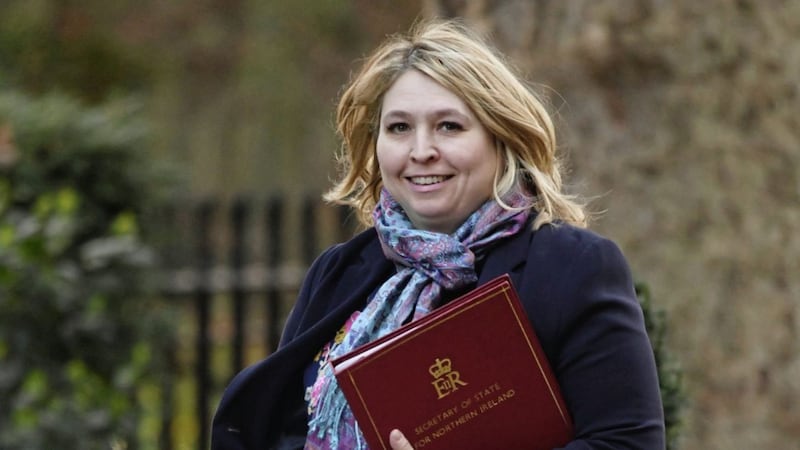A telling aspect of Karen Bradley’s comment in the Commons, claiming no Troubles security force killings were a crime, is that it was not an answer to the question she was asked.
The secretary of state was responding to DUP MP Emma Little Pengelly, who asked what mechanisms would be put in place to investigate unsolved terrorist murders.
Pengelly made no mention of the security forces. Bradley’s rush to absolve them of all wrongdoing, even appearing to describe murder as “dignified and appropriate”, blanked the DUP and terrorist victims as well. The secretary of state then initially refused to apologise - a stance defended by the attorney general Geoffrey Cox MP.
The blunt fact is that prosecuting former soldiers is completely unacceptable in Britain and this is Westminster’s only legacy concern. That points to a security force amnesty, which would require a general Troubles amnesty - unacceptable to unionism, which is why the DUP never suggests it.
Sinn Féin and a previous British government agreed such an amnesty in 2005, before the legislation was withdrawn under SDLP pressure. But the prospect of fresh Troubles prosecutions can only resurrect the idea. While a formal amnesty is a legal impossibility, something to the same effect is the only political possibility.
**
In better news, the falling out between Sinn Féin and the PSNI at the Policing Board has been quietly resolved. The party will now take its seat with other board members in selecting the next chief constable. A resolution of the potentially disastrous row, sparked by comments from Sinn Féin president Mary Lou McDonald, was flagged up at the weekend when deputy leader Michelle O’Neill said: “I think we can be easily distracted... I’m most concerned about victims.”
Sinn Féin never wanted to undermine policing - it rejoined the reconstituted Policing Board six weeks ago without any hesitation. The whole episode has been a lesson in how quickly fears and conspiracy theories spring up in the present political vacuum.
**
A proposal by councils to fill some of that vacuum, supported by all five main parties, has been put on an infinite loop by the NIO. The Northern Ireland Local Government Association, representing the 11 councils, set up a body last year called the Central Local Government Partnership Forum, which is seeking an oversight role on issues spanning council and Stormont remits, such as planning and waste management.
Asked about this in the Commons, NIO minister John Penrose said local government is a devolved matter, so only Stormont can give councils oversight. This appears to contain at least two Catch-22s, making it a Catch-44.
**
John Penrose rose again in the Commons this week to complain about a letter sent out by Northern Ireland Civil Service chief David Sterling, warning of dire consequences from a no-deal Brexit.
There have been “raised eyebrows” at this “politically charged comment from a civil servant,” Penrose informed MPs.
In the genteel world of public administration, this is the equivalent of a fight in a pub car park. Sterling could well respond that as the NIO insists on leaving him entirely in charge of devolved government, without even a few councillors for democratic cover, political comment is only to be expected.
**
The gay cake case highlighted the absurdity of Northern Ireland’s unique laws against “political discrimination”, a term that originated in the 1970s as a shorthand for ‘unionist or nationalist’ but has since been interpreted by the courts to mean any political view. These laws really need to be scrapped or rewritten but instead it seems they are destined to ‘leak’ into the rest of the UK. A legal opinion just published by an Oxford academic in the influential UK Labour Law blog reckons the involvement of the Supreme Court and the Human Rights Act in the gay cake case means people in Britain can now bring similar cases - and critically, lose them.
For example, an employee can claim they were sacked for expressing a political view and an employer can successfully defend themselves, as Ashers Bakery ultimately did, by citing their own right not to endorse a view.
What a mess. And what a pity rights-based laws in Britain leak so slowly in the opposite direction.
**
Border Communities Against Brexit (BCAB), a campaign group strongly supported by Sinn Féin, has announced a series of protests along the border on March 30 in objection to Brexit in general.
It will be interesting to see if these plans are changed should the UK’s scheduled EU departure on March 29 be delayed, or if it leaves on that date with a withdrawal agreement. In December 2017, BCAB called off a major border protest at short notice because the backstop had just been unveiled, apparently answering all the group’s concerns.
A cynic might say this protected the part of the Good Friday Agreement where republicans are too clever to admit they have lost and unionists are too stupid to realise they have won.
newton@irishnews.com









